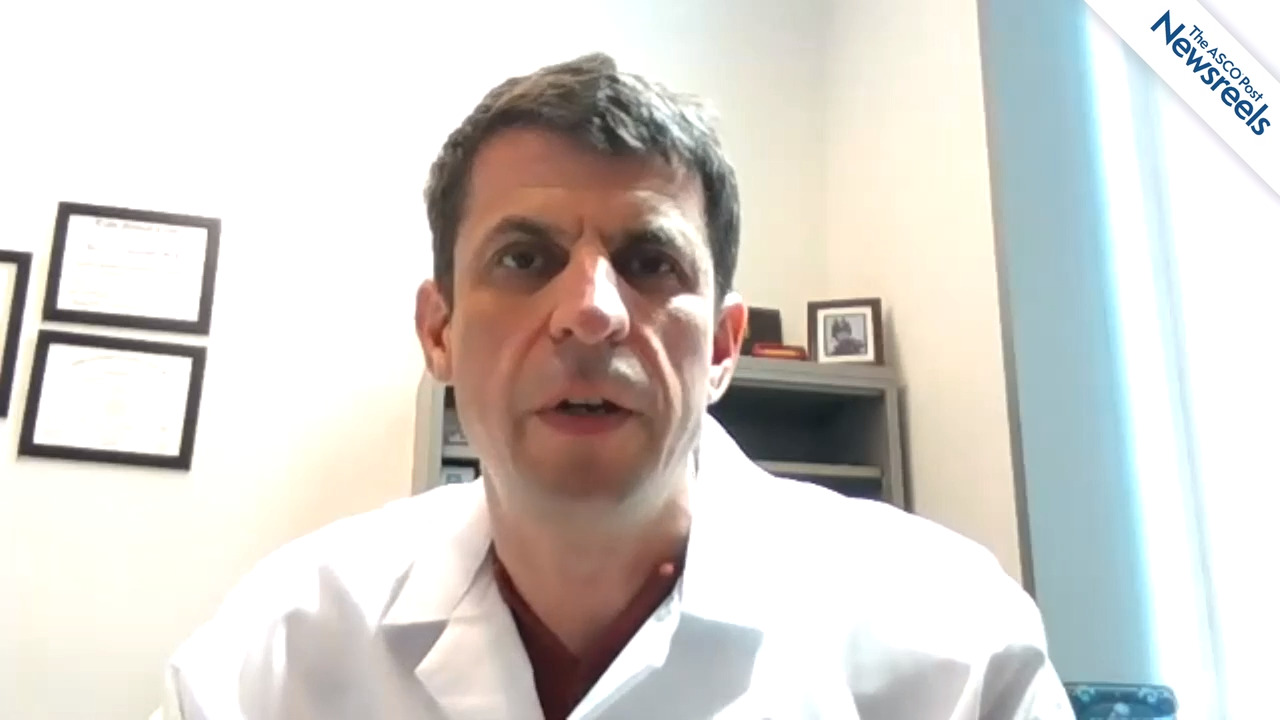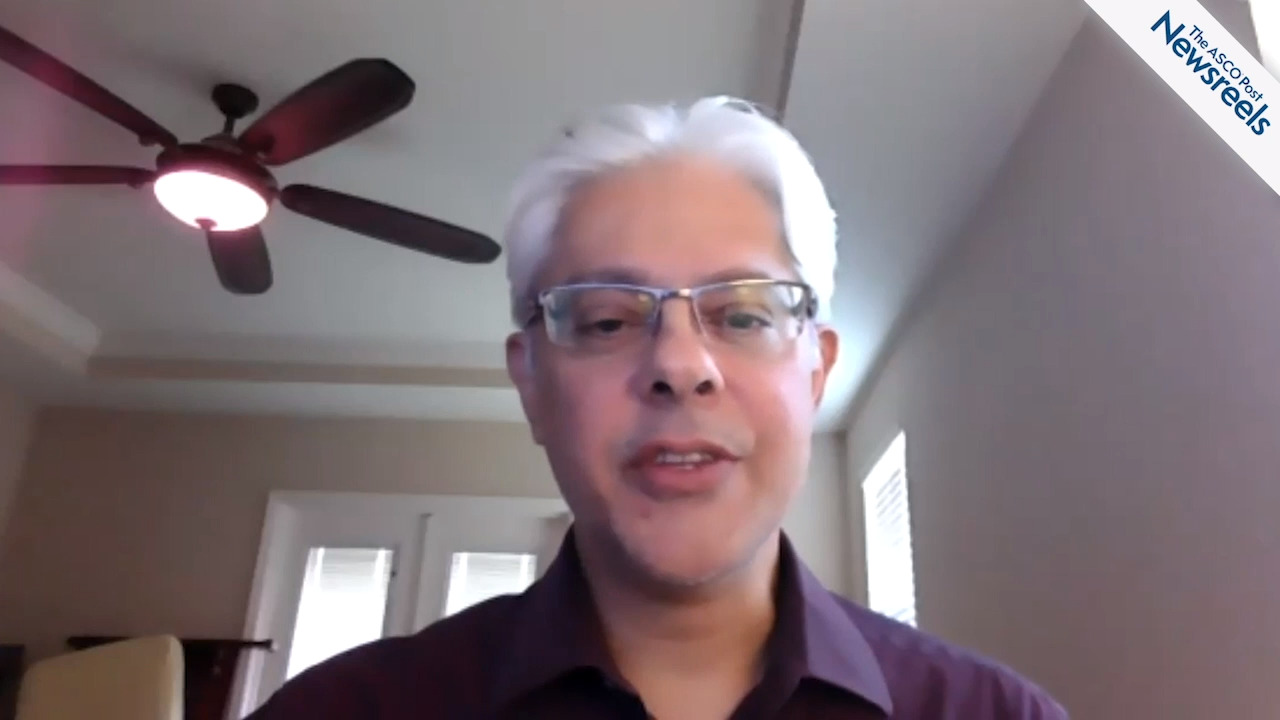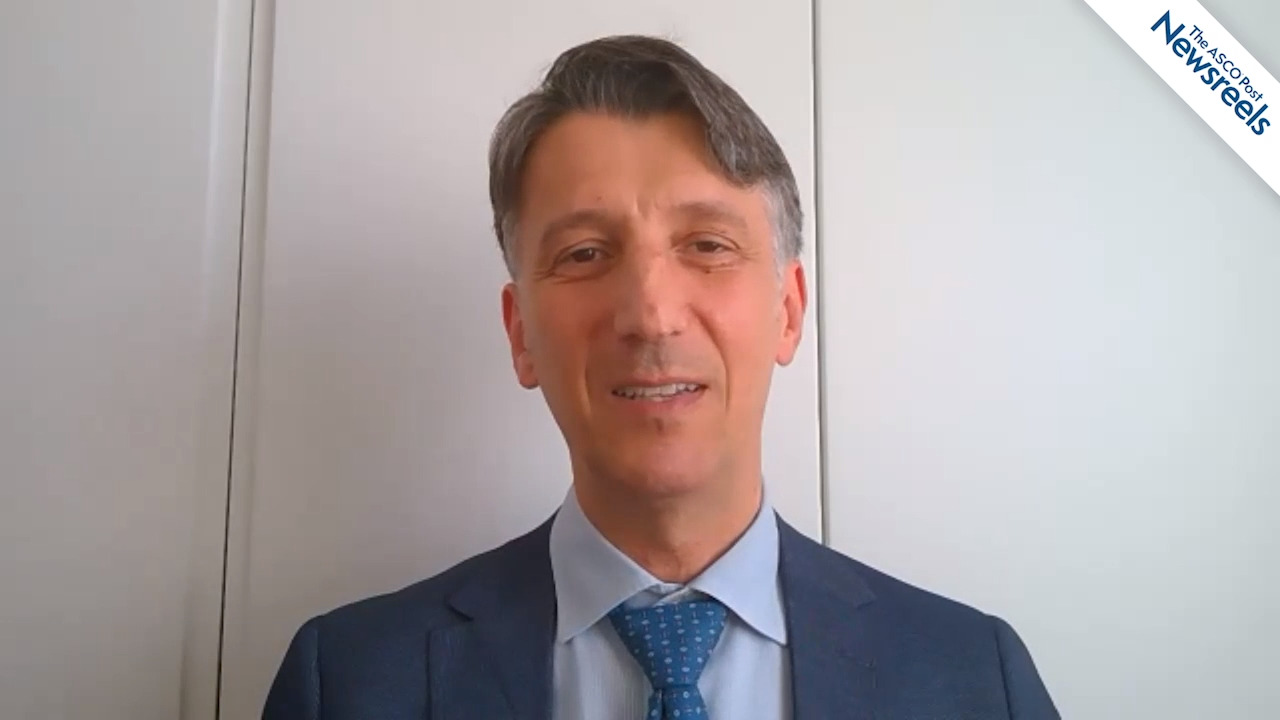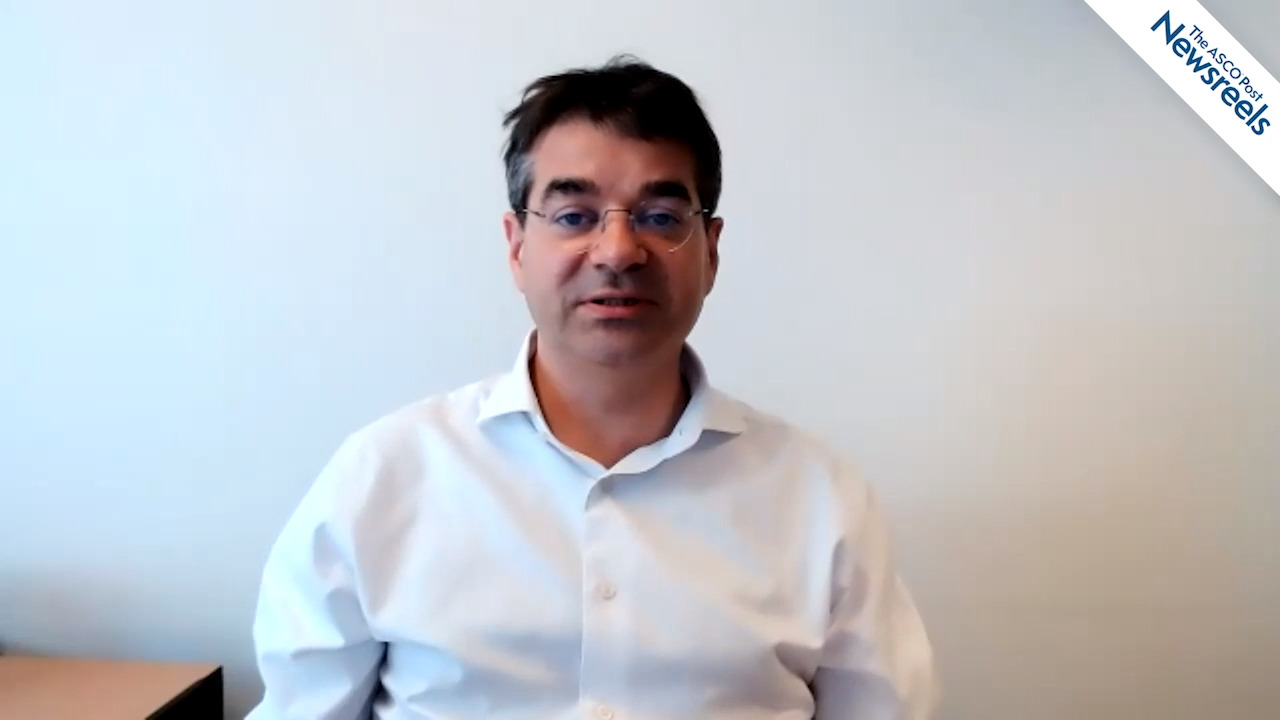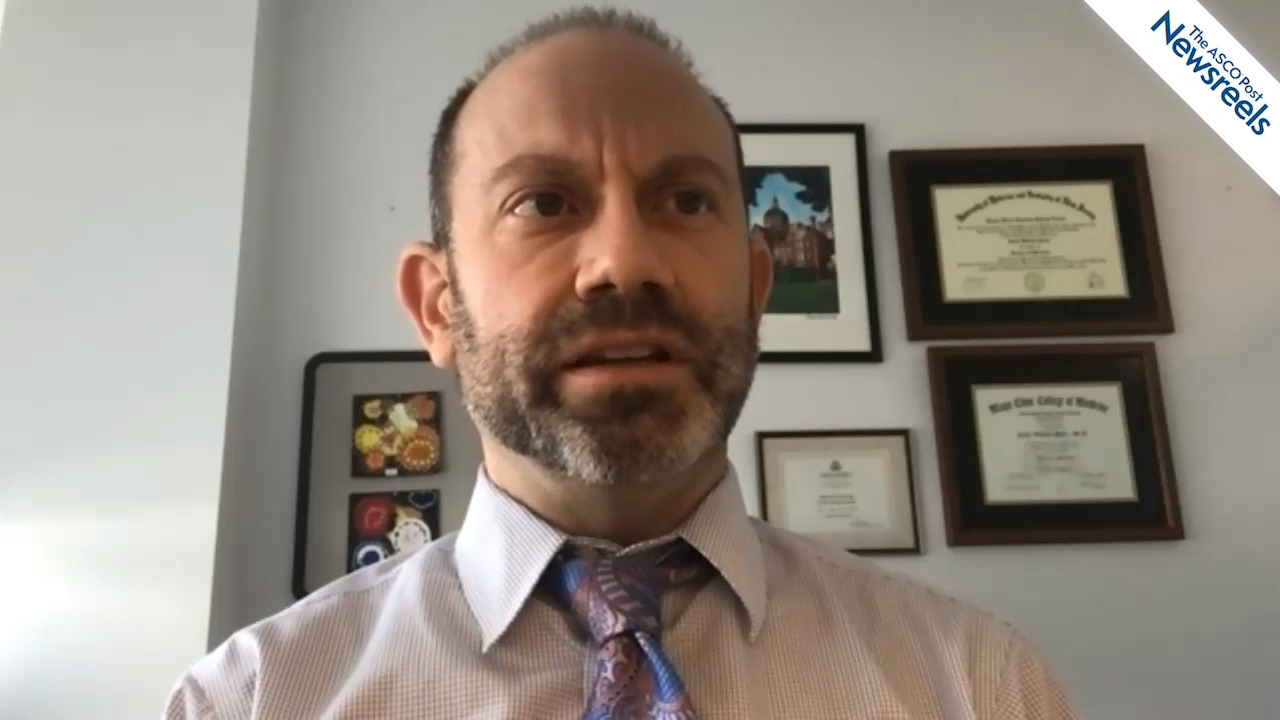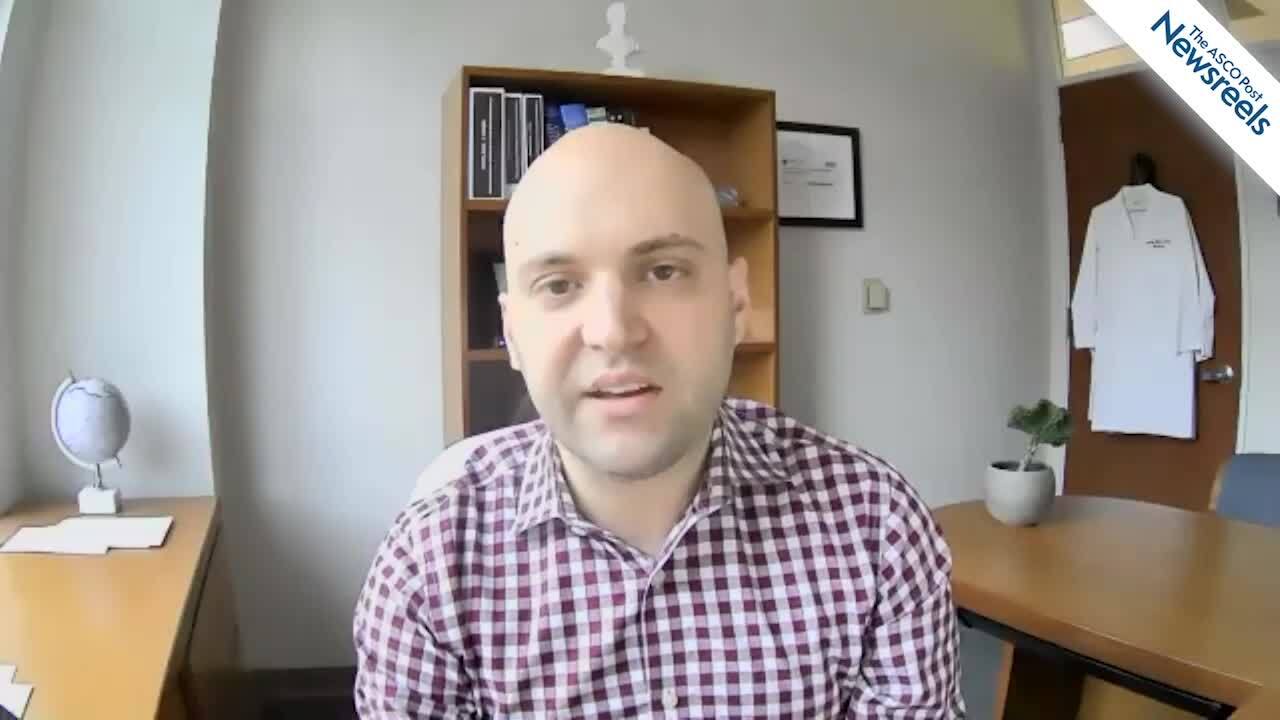Donor-Derived CD7 CAR T Cells May Lead to Remissions in Patients With Relapsed or Refractory T-ALL
In a Chinese single-institution phase I study reported in the Journal of Clinical Oncology, Pan et al found that donor-derived CD7 chimeric antigen receptor (CAR) T-cell therapy produced a high complete remission rate in patients with relapsed or refractory T-cell acute lymphoblastic leukemia...
Experimental Small-Molecule Inhibitor May Improve Responses to Cellular Therapies in Advanced CLL
Too many “exhausted” T cells left in the wake of aggressive chemotherapy regimens for patients with advanced chronic lymphocytic leukemia (CLL) make it more challenging for chimeric antigen receptor (CAR) T-cell therapy to do its job. Now, a new study from researchers at the Perelman School of...
Alexey V. Danilov, MD, PhD, on Lymphoid Malignancies: Novel Agents Targeting BTK Inhibitor–Resistant Disease
Alexey V. Danilov, MD, PhD, of City of Hope, discusses the uses and side effects of cellular and immune therapies, including venetoclax and obinutuzumab, which may prove to be effective in treating highly resistant lymphoid malignancies such as chronic lymphocytic leukemia.
FDA Pipeline: Reviews for Agents in Lung Cancer, Thyroid Cancer, Kidney Cancer, and More
Recently, the U.S. Food and Drug Administration (FDA) accepted applications for agents aiming to treat non–small cell lung cancer (NSCLC), differentiated thyroid cancer, renal cell carcinoma (RCC), hypersensitive acute lymphoblastic leukemia (ALL), mucosal melanoma, and endometrial carcinoma....
Asparaginase Erwinia Chrysanthemi (Recombinant)-rywn for Acute Lymphoblastic Leukemia and Lymphoblastic Lymphoma
On June 30, 2021, asparaginase erwinia chrysanthemi (recombinant)-rywn was approved as a component of a multiagent chemotherapeutic regimen for treatment of acute lymphoblastic leukemia (ALL) and lymphoblastic lymphoma in adult and pediatric patients 1 month or older who have developed...
Expert Point of View: Jacqueline C. Barrientos, MD, MS
The ASCO Post invited Jacqueline C. Barrientos, MD, MS, Associate Professor of Medicine, CLL Research and Treatment Program, Zucker School of Medicine at Hofstra/Northwell, Lake Success, New York, to comment on the ALPINE findings presented at the European Hematology Association (EHA) Virtual...
Zanubrutinib Superior to Ibrutinib for CLL/SLL in Phase III ALPINE Trial
Zanubrutinib, a second-generation Bruton’s tyrosine kinase (BTK) inhibitor, significantly improved response rates and delayed disease progression as compared with the standard of care, ibrutinib, in patients with relapsed or refractory chronic lymphocytic leukemia or small lymphocytic lymphoma...
ELEVATE-RR Trial: Acalabrutinib vs Ibrutinib in Previously Treated Patients With CLL
As reported in the Journal of Clinical Oncology by John C. Byrd, MD, and colleagues, the phase III ELEVATE-RR trial has shown noninferior progression-free survival with the more selective Bruton’s tyrosine kinase (BTK) inhibitor acalabrutinib vs the less selective inhibitor ibrutinib in previously...
Expert Point of View: Guru Subramanian Guru Murthy
Invited discussant Guru Subramanian Guru Murthy, MD, MS, of the Medical College of Wisconsin, Milwaukee, commented on the study of aspacytarabine in the first-line therapy for patients with acute myeloid leukemia (AML) unfit for standard chemotherapy. “This study elegantly highlights there is still ...
Study Finds Cytarabine Prodrug Active and Safe in Older Compromised Patients With AML
Aspacytarabine, a cytarabine prodrug, was reported to be safe and effective as first-line therapy for patients with acute myeloid leukemia (AML) who were unfit for intensive induction chemotherapy, according to the results of a phase II study presented during the 2021 ASCO Annual Meeting.1 The...
Pulsed Vincristine/Dexamethasone Maintenance in Pediatric Acute Lymphoblastic Leukemia
In a Chinese phase III trial (CCCG-ALL-2015) reported in The Lancet Oncology, Yang et al found that 1 year of maintenance therapy with pulsed vincristine and dexamethasone was noninferior to 2 years in low-risk pediatric patients with acute lymphoblastic leukemia and was borderline inferior in...
Can Treatment With Thiopurines Induce Mutations That May Lead to Pediatric Leukemia Relapse?
Chemotherapy has helped make acute lymphoblastic leukemia (ALL) one of the most survivable childhood cancers. Now, a research team has shown how thiopurines may lead to mutations that set patients up for disease relapse. These findings were published by Yang et al in Nature Cancer. The research...
B-Cell Acute Lymphoblastic Leukemia: Update on Clinical Trials
“Learning never exhausts the mind.” —Leonardo da Vinci To complement The ASCO Post’s continued comprehensive coverage of the 2020 American Society of Hematology (ASH) Annual Meeting & Exposition, here are several abstracts selected from the meeting proceedings focusing on treatments under study ...
Phase III GLOW Trial: Improved Outcomes With First-Line Ibrutinib Plus Venetoclax in Elderly Patients With CLL
Fixed-duration ibrutinib and venetoclax as a first-line treatment yielded superior outcomes compared with chlorambucil plus obinutuzumab in patients with chronic lymphocytic leukemia (CLL), based on the primary analysis of the phase III GLOW trial presented during the European Hematology...
Combination Ficlatuzumab and Cytarabine Show Clinical Activity in Relapsed/Refractory AML
Despite advances in the treatment of acute myeloid leukemia (AML), only 29.5% of patients with the cancer are alive 5 years after diagnosis. Even with aggressive therapy, just 30% of patients achieve a complete remission with a median survival of 7.5 months, making it imperative to develop novel...
Calaspargase Pegol vs Pegaspargase in Pediatric ALL
In a phase III trial (DFCI 11-001) reported in the Journal of Clinical Oncology, Vrooman et al found that the novel pegylated asparaginase formulation calaspargase pegol (calaspargase) given every 3 weeks was associated with similar serum asparaginase activity nadir values, survival outcomes, and...
Being Both a Cancer Provider and a Cancer Survivor Is a Rare Privilege
Perhaps my 35-year career as a surgical oncologist and researcher specializing in soft-tissue sarcomas should have prepared me to recognize the signs of chronic lymphocytic leukemia (CLL) when they first appeared a few days before Christmas in 2016, but it did not. In fact, my symptoms were so...
Expert Point of View: Jacqueline C. Barrientos, MD
The invited discussant of the phase I trial of lisaftoclax (APG-2575), Jacqueline C. Barrientos, MD, of Hofstra/Northwell, Great Neck, New York, commented on the positive findings: “The 15 patients with chronic lymphocytic leukemia [CLL] had an objective response rate of 80% and a median time to...
Novel BCL2 Inhibitor Shows Activity in CLL in Phase I Trial
The novel, selective BCL2 inhibitor lisaftoclax (APG-2575) has shown activity in the treatment of relapsed or refractory chronic lymphocytic leukemia (CLL) in a phase I study reported at the 2021 ASCO Annual Meeting.1 Preliminary data suggest that lisaftoclax stands out for its favorable safety...
Expert Point of View: Jacqueline C. Barrientos, MD, MS
Invited discussant Jacqueline C. Barrientos, MD, MS, of Northwell Health Cancer Institute, Zucker School of Medicine at Hofstra/Northwell in Great Neck, New York, noted that, although both ibrutinib and venetoclax have shown superior results to chemotherapy, each drug is associated with toxicity....
Fixed-Dose, First-Line Ibrutinib/Venetoclax Combination Achieves Durable Remissions in CLL
The combination of fixed-duration, first-line treatment with ibrutinib plus venetoclax achieved complete responses in more than half of patients with chronic lymphocytic leukemia (CLL)/small lymphocytic leukemia (SLL), based on the primary analysis of the fixed-dose cohort of the phase II CAPTIVATE ...
Arsenic Plus All-Trans Retinoic Acid for Pediatric Patients With Acute Promyelocytic Leukemia
In a Chinese study (CCLG-APL2016) reported in the Journal of Clinical Oncology, Zheng et al found that the combination of arsenic with all-trans retinoic acid (ATRA) was associated with good survival outcomes in pediatric patients with acute promyelocytic leukemia. Study Details The multicenter...
Humanized CD19-Targeted CAR T-Cell Treatment in Patients With Relapsed or Refractory B-Cell ALL
In a pilot study reported by Myers et al in the Journal of Clinical Oncology, a humanized CD19-targeted chimeric antigen receptor (CAR) T-cell product developed by the investigators (huCART19) was found to produce durable remissions and prolonged CAR T-cell persistence in CAR-naive and CAR-exposed...
Effect of Myeloid Progenitor Cell Product on the Risk of Infection During Induction Chemotherapy for AML
In a phase II trial reported in the Journal of Clinical Oncology, Desai et al found that the addition of the myeloid progenitor cell product romyelocel-L to granulocyte colony-stimulating factor (G-CSF) reduced the incidence of infection and antimicrobial use vs G-CSF alone during induction...
Lessons From Pneumococcal Vaccine Responses in Patients With CLL in an Evolving Vaccine Landscape
The role of vaccines in mitigating the significant morbidity and mortality associated with infections in chronic lymphocytic leukemia (CLL) is a developing field of study, punctuated by the advent of novel therapeutic agents and pressing questions regarding the global SARS–CoV-2 vaccination...
Low Response Rates to Conjugate Pneumococcal Vaccine in Patients With Chronic Lymphocytic Leukemia
In an Italian study reported in Leukemia, Francesca Romana Mauro, MD, of the Department of Translational and Precision Medicine, Sapienza University, Rome, and colleagues found that only a small minority of patients with chronic lymphocytic leukemia (CLL) developed an adequate immune response to...
Martin Kaiser, MD, on Myeloma and Plasma Cell Leukemia: Transplantation Plus Daratumumab/CVRD Therapy
Martin Kaiser, MD, of The Institute of Cancer Research and Royal Marsden Hospital, discusses findings from the UK OPTIMUM/MUKNINE trial on the depth of response and minimal residual disease status in patients with ultra-high–risk newly diagnosed multiple myeloma and plasma cell leukemia who were treated with augmented autologous transplant and daratumumab plus cyclophosphamide, bortezomib, lenalidomide, and dexamethasone (Abstract S181).
Bijal D. Shah, MD, on CLL: CAR T-Cell Therapy With Brexucabtagene Autoleucel
Bijal D. Shah, MD, of the H. Lee Moffitt Cancer Center, discusses phase II results of the ZUMA-3 study, which evaluated brexucabtagene autoleucel (KTE-X19), an anti-CD19 CAR T-cell therapy, in adults with relapsed or refractory B-cell acute lymphoblastic leukemia (Abstract 7002).
Paolo Ghia, MD, PhD, on CLL/SLL and Ibrutinib Plus Venetoclax: A Primary Analysis of the CAPTIVATE Trial
Paolo Ghia, MD, PhD, of the Università Vita-Salute San Raffaele, discusses phase II results from the CAPTIVATE study, which examined ibrutinib plus venetoclax as a fixed-duration first-line treatment in patients with chronic lymphocytic leukemia/small lymphocytic lymphoma (Abstract 7501).
Brexucabtagene Autoleucel in Adults With Relapsed or Refractory B-Cell ALL: ZUMA-3
As reported in The Lancet by Shah et al, the pivotal phase II ZUMA-3 trial has shown a high rate of complete remission with the autologous anti-CD19 chimeric antigen receptor (CAR) T-cell therapy brexucabtagene autoleucel (formerly KTE-X19) in adults with relapsed or refractory B-cell acute...
Study Explores Incidence Rates for Various Pediatric Cancers Across Age and Racial Groups
New research has uncovered substantial differences in the rates of childhood cancers when considering a single year of age rather than grouping several years together. The study, published by Marcotte et al in the journal Cancer, also found that minority children seem to have different risks than...
Ibrutinib/Venetoclax vs Chlorambucil/Obinutuzumab in Previously Untreated Older Patients With CLL/SLL
In a primary analysis of the phase III GLOW study, a once-daily, all-oral, fixed-duration dose of ibrutinib and venetoclax for chronic lymphocytic leukemia (CLL)/small lymphocytic lymphoma (SLL) resulted in superior progression-free survival than treatment with chlorambucil and obinutuzumab. Arnon...
Arnon P. Kater, MD, PhD, on CLL: Fixed-Duration Ibrutinib and Venetoclax vs Chlorambucil Plus Obinutuzumab
Arnon P. Kater, MD, PhD, of the University of Amsterdam, discusses a primary analysis of the phase III GLOW study, which, for the first time, compared the efficacy and safety of fixed-duration ibrutinib plus venetoclax with chlorambucil plus obinutuzumab for first-line treatment of older patients with chronic lymphocytic leukemia (LB1902).
Keith W. Pratz, MD, on AML: Venetoclax, Azacitidine, and Disease Response
Keith W. Pratz, MD, of the University of Pennsylvania, discusses the outcomes of patients with acute myeloid leukemia who took part in the VIALE-A trial and were treated with venetoclax and azacitidine. The patients had achieved both composite complete remission and measurable residual disease of < 10-3 (Abstract S137).
Zanubrutinib vs Ibrutinib in Relapsed/Refractory CLL/SLL: ALPINE Trial
Zanubrutinib—a second-generation Bruton's tyrosine kinase (BTK) inhibitor—significantly improved response rates and delayed disease progression as compared to the standard of care, ibrutinib, in patients with relapsed or refractory chronic lymphocytic leukemia or small lymphocytic lymphoma...
Addition of Gemtuzumab Ozogamicin to Conventional Background Chemotherapy in Pediatric Patients With KMT2A-Rearranged AML
As reported in the Journal of Clinical Oncology by Pollard et al, a subgroup of pediatric patients with KMT2A-rearranged acute myeloid leukemia (AML) in the phase III Children’s Oncology Group AAML0531 trial had improved outcomes with the addition of the CD33-targeting agent gemtuzumab ozogamicin...
Nicholas J. Short, MD, on ALL: Ponatinib Plus Blinatumomab May Help Patients Avoid Transplants
Nicholas J. Short, MD, of The University of Texas MD Anderson Cancer Center, discusses early results from a phase II study which showed that combining ponatinib and blinatumomab in patients with Philadelphia chromosome–positive acute lymphoblastic leukemia may prove to be an effective chemotherapy-free regimen that might reduce the need for allogeneic hematopoietic stem cell transplant (Abstract 7001).
Venetoclax Plus FLAG-IDA Induction and Consolidation for AML
In a single-institution phase I/II study reported in the Journal of Clinical Oncology, Courtney D. DiNardo, MD, and colleagues found that the combination of venetoclax with FLAG-IDA (fludarabine, cytarabine, granulocyte colony-stimulating factor, and idarubicin) in induction and consolidation...
Ibrutinib/Venetoclax Provides Durable Remission for Patients With Newly Diagnosed CLL
The combination of ibrutinib and venetoclax was found to provide lasting disease remission in patients with newly diagnosed chronic lymphocytic leukemia (CLL). Findings from a single-institution phase II study were published by Nitin Jain, MD, and colleagues in JAMA Oncology and provide the longest ...
Update on Clinical Trials in Acute Myeloid Leukemia
To complement The ASCO Post’s continued comprehensive coverage of the 2020 American Society of Hematology (ASH) Annual Meeting & Exposition, here are several abstracts selected from the meeting proceedings focusing on acute myeloid leukemia (AML), such as the use of venetoclax added to...
Ponatinib/Blinatumomab Demonstrates High Rates of Complete Molecular Response in Philadelphia Chromosome–Positive ALL
The combination of ponatinib and blinatumomab was found to be safe and highly effective in patients with newly diagnosed or relapsed/refractory Philadelphia chromosome–positive acute lymphoblastic leukemia (ALL). The study—presented by Nicholas J. Short, MD, and colleagues during the 2021 ASCO...
Cancer Has Taught Me to Live With Purpose
I have had two life-threatening cancers over the past 3 decades and can say without equivocation that there is never a good time to get cancer. My first cancer diagnosis happened in 1992, just weeks after I had accepted the position of Chief Executive Officer of Hughes Electronics. The job meant a...
Oral Azacitidine Improves Overall Survival vs Placebo as Maintenance Therapy for AML in First Remission
As reported in The New England Journal of Medicine by Andrew H. Wei, MB, BS, PhD, of the Australian Centre for Blood Diseases, Monash University, Melbourne, and colleagues, the phase III QUAZAR AML-001 trial has shown prolonged overall survival with oral azacitidine maintenance therapy vs placebo...
How MRD Assessment May Help Guide Treatment Selection for Patients With AML
Complete morphologic remission is considered the first requirement for achieving long-term, leukemia-free survival and a potential cure in patients with acute leukemia, including acute myeloid leukemia (AML), and is the goal of all therapeutic strategies to date. Recognizing that the majority of...
Acute Myeloid Leukemia World Awareness Day 2021: April 21
After a great response to Acute Myeloid Leukemia World Awareness Day (AML WAD) in 2020, Know AML looks forward to commemorating AML WAD in 2021. AML WAD will take place on April 21, 2021, with the aim to facilitate and improve knowledge of AML worldwide through collaborative participation. Know AML ...
Recent Studies Explore Efficacy of COVID-19 Vaccination in Patients With Leukemia and Myeloma
Two new studies published in the journal Blood suggest that the BNT162b2 mRNA COVID-19 vaccine may have reduced efficacy in individuals with chronic lymphocytic leukemia (CLL) and multiple myeloma. According to researchers, these studies could help inform the ideal time for vaccination of these...
Certain Genetic Mutations May Increase Risk of Death From Infection in Patients With CLL
Death from infection—the leading cause of death for patients with chronic lymphocytic leukemia (CLL)—may be linked to specific gene mutations, according to results from a study published by Else et al in the journal Leukemia. Testing for these mutations could be used to identify patients at a...
RARA Agonist Plus Azacitidine Shows Encouraging Activity in Relapsed/Refractory AML
The novel agentSY-1425 combined with azacitidine appears to be active in retinoic acid receptor alpha (RARA) superenhancer–positive newly diagnosed and relapsed or refractory acute myeloid leukemia (AML), according to the results of a phase II trial presented at the 2020 American Society of...
Long-Term Follow-up of Children and Young Adults With B-Cell ALL Treated With CD19 CAR T-Cell Therapy
In a long-term follow-up of a National Cancer Institute (NCI) phase I trial reported in the Journal of Clinical Oncology, Nirali N. Shah, MD, and colleagues found that autologous CD19 chimeric antigen receptor (CAR) T-cell therapy followed by allogeneic hematopoietic stem cell transplantation can...
Risk of Leukemia in Pediatric Patients With Down Syndrome
In a recent study reported by Marlow et al in The Journal of Pediatrics, researchers assessed the risk of leukemia in children with Down syndrome. Their findings pointed to stronger-than-expected associations between Down syndrome and acute myeloid leukemia (AML). Down syndrome is one of the most...
